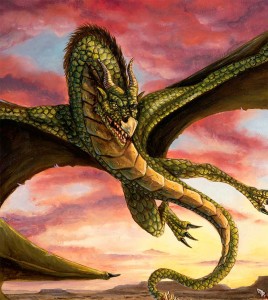The false dragons of the steppes, the wyvere is a terror anywhere it is seen. Large, covered in multicolored scales, its long wings carry is far from its roosts in the steppelands.
Wyvere
- Challenge Rating: 11
- Size: Large
- Type: Draconian
- Initiative: +5
Defense
- Hit Points: 126 (12d12 +48)
- Armor Class: 25, touch 10, flat footed 24 (+1 dex, +15 natural armor, -1 size)
- Saves: Fort +12 Ref +9 Will +10
Offense
- Speed: 60 ft, fly 200ft
- Base Attack: +12
- Melee: Bite +18 (2d6+9) with poison; Tail slap +12 (1d8+9)
- Ranged:
- Special Attacks: Venomous bite / paralytic; venomous spit, range 30 ft. 1d6 acid damage per round for 1d3 rounds.
Statistics
- Abilities: Str 23, Dex 12, Con 19, Int 12, Wis 15, Cha 12
- Skills: Athletics 3, Awareness 5, Endurance 2, Survival 5
- Talents: Alertness, Cleave, Weapon Specialty (bite, tail)
- Special Qualities: Immune to poison.
Ecology
- Environment: Desert
- Organization: Single, Pair
- Treasure: Double
Special Abilities
This venomous creature may either attempt to inject venom using a vicious bite or attack with its spiked tail which it slathers in venom. The wyvere typically likes to swoop over its victim and slap with its envenomed tail.
Spit Acidic Venom (Ex): The wyvere can spit its acidic venom up to 30 feet as a standard action. This venom is a sticky corrosive fluid that aids in digesting the intended victim prior to eating. This is a ranged touch attack with no range increment. Any opponent hit by this attack takes 6d6 points of acid damage (Reflex DC 18 halves).
The wyvere lives in the steppes. It is said it is a lesser cousin of the great dragons of old. It has only two legs and uses its front wings for stabilization while on the ground.
This creature does not weigh much for its size as it has to be capable of non-magical flight. Its scales are very tough and its hide is prized by hunters of rare game. The belly scales are almost as strong as metal and often large enough to be used as a breastplate. Wyvere eggs are also rumored to have medicinal qualities and are prized by humans.
